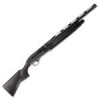Beretta 1301 Competition User Manual - Page 25
Routine Maintenance - problems
 |
View all Beretta 1301 Competition manuals
Add to My Manuals
Save this manual to your list of manuals |
Page 25 highlights
ROUTINE MAINTENANCE Clean and lubricate your shotgun any time combustion residue, grease or dirt is deposited in any of the mechanisms. Cleaning and lubrication of the firearm after each use is the best way of ensuring that the components are protected against combustion corrosion or rusting from use in humid or salty environments. At the end of a shooting day, carry out the Routine Maintenance as indicated below. WARNING: Always check that the shotgun is unloaded (empty cartridge chamber, empty receiver, empty magazine). Inspect the firearm by looking through the ejection port, the loading gate and the chamber. If it is not empty, unload it as instructed in the relevant section. Check that the hammer is decocked. WARNING: Never point the firearm at someone or at hard, flat surfaces. Always treat the shotgun as if it were loaded. (See points 1, 2 and 4 of the BASIC SAFETY RULES). NOTICE: For Routine Maintenance, simply disassemble it following the procedures described in the relevant section. BARREL • Carefully clean the inside of the barrel with a cloth patch to remove any combustion residue. • Thoroughly clean the locking shoulders on the barrel breech. • Pull a soft, clean, dry cloth through the barrel. • Lightly lubricate the barrel with a soft clean cloth soaked with Beretta Gun Oil. • Check the barrel. The barrel and cartridge chamber must be clean and free from obstructions. CAUTION: Excess oil or grease obstructing the barrel, even partially, is very dangerous when firing and may cause damage to the shotgun and serious injury to the shooter and to bystanders. Never spray or apply oil to the cartridges. Use lubricants properly. You are responsible for the proper care and maintenance of your firearm. GAS CYLINDER, PISTON, MAGAZINE TUBE CAUTION: Use of Magnum and Super Magnum cartridges results in high combustion gas emissions. The particular composition of the powders of some Super Magnum ammunition can leave consistent deposits of combustion residue. The parts of the shotgun where this problem is most likely to arise are the gas cylinder, the piston and elastic piston seal and the magazine tube. EN 25















